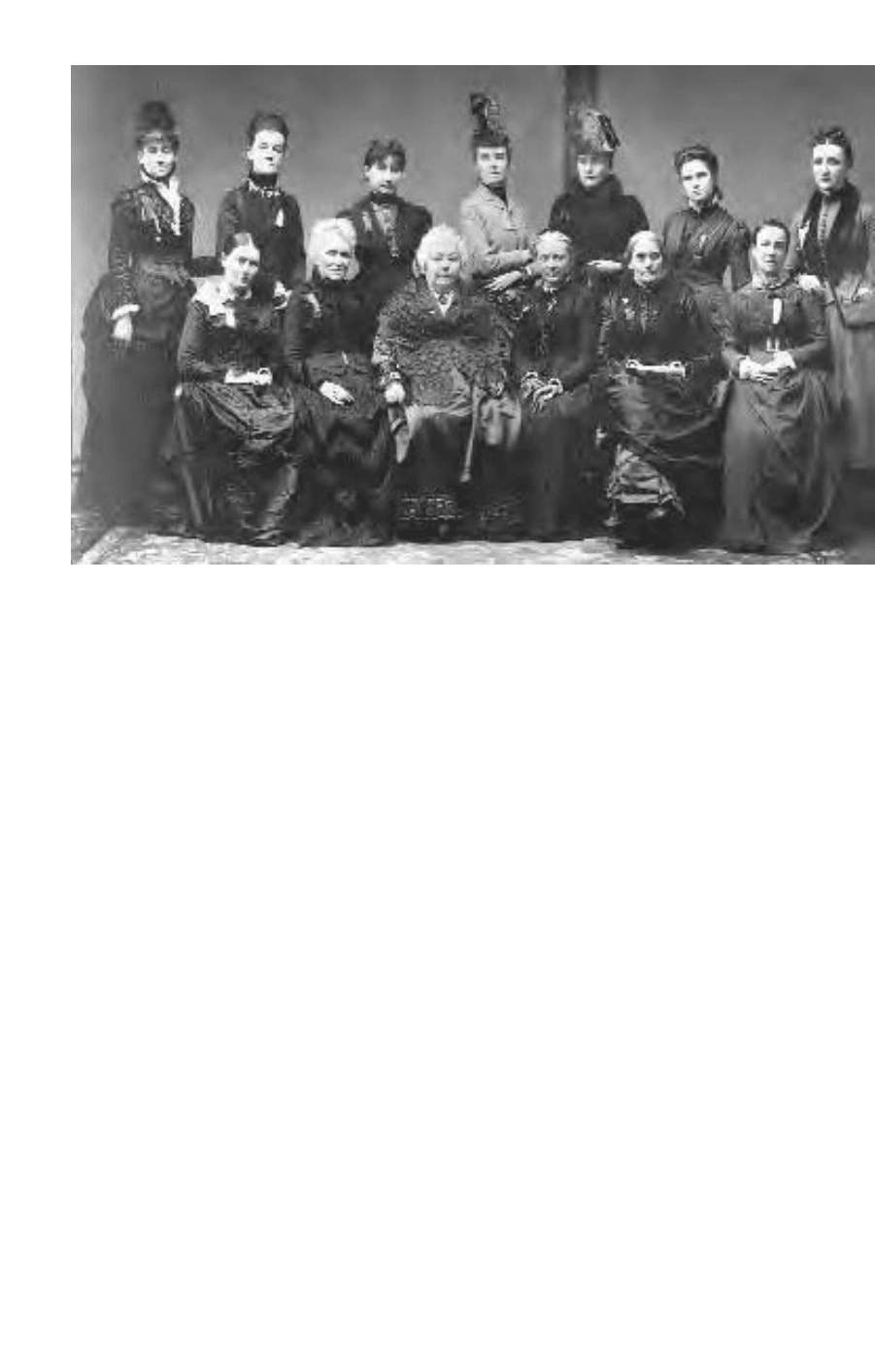Schenken Suzanne O’Dea. From Suffrage to the Senate: An Encyclopedia of American Women in Politics (2 Volumes)
Подождите немного. Документ загружается.


Born in Augusta, Maine, Olympia Snowe was the daughter of Greek
immigrants. When she was eight years old, her mother died, and then her
father died the next year. An aunt and uncle raised her. Snowe earned her
bachelor of arts degree from the University of Maine in 1969.
See also Abortion; Child Day Care; Congress, Women in; Congressional Caucus
for Women’s Issues; Economic Equity Act; State Legislatures, Women in
References www.senate.gov/~snowe/bio.htm.
Social Security
Enacted in 1935, the Social Security Act created a federal old-age assis-
tance program for retired workers and a federal and state program of un-
employment insurance, among other programs. Since its creation, Social
Security has been amended several times, with some programs moved to
other agencies and other programs added to it. These amendments cre-
ated the Medicare and Medicaid programs and established assistance pro-
grams for disabled people and children of disabled or deceased people.
The creation of Medicare in 1965, providing for the medical needs of per-
sons ages sixty-five and older, was one of the more important additions to
the program. Social Security is financed by employees who pay 7.65 per-
cent of their earnings to the fund, an amount that employers match, and
by self-employed people who pay the full 15.3 percent.
For about two-thirds of the nation’s elderly population, Social Secu-
rity provides 50 percent or more of their retirement income. Of the 44
million people receiving Social Security, almost 60 percent are women; the
program provides about 90 percent of elderly women’s income. This as-
sistance is especially important to women because only 38 percent of
women receive pension benefits provided by their employers, whereas 57
percent of men receive them. Between 1965 and 1996, Social Security re-
duced the percentage of elderly people living below the poverty level from
35.2 percent to 10.8 percent.
Social Security programs also benefit younger Americans. The Social
Security Supplemental Income (SSI) program contributes to the support
of 3 million children and their sole-caretaker parents. Four million dis-
abled workers under the age of sixty-five and their 1.6 million dependents
receive benefits.
References www.ssa.gov; www.now.org.
Socialism
In the last decades of the nineteenth century and the early decades of the
twentieth century, socialism appealed to people living with the harshness
of factory labor, poverty, and hunger. Women activists like Ella Reeve
Socialism 629

Bloor, Dorothy Day, Elizabeth Gurley Flynn, Emma Goldman, and Kate
Richards O’Hare believed that capitalism had enslaved the American la-
borer and that a Socialist economic system would end the inequities in-
herent in capitalism. Each of these women as well as others sought to
unify laborers through unions or other organizations and use the result-
ing power to end the abuses of capitalism.
The contemporary meaning of socialism is based upon the writings
of Karl Marx, who theorized that history is determined by economic sys-
tems. The economic systems dictate society’s political, social, and intellec-
tual life. Marx argued that the exploitation of the working class in capital-
ist society would result in revolution and predicted that a classless society
based on communism would replace capitalism. Regarding history
through the perspective of class struggle, socialism rejects the primacy of
private property and advocates making it into public property and dis-
tributing the wealth throughout the population.
In the United States, the Industrial Workers of the World (IWW),
formed in 1905, sought to organize industrial employees into one all-
encompassing union that would lead a mass strike and end capitalism. The
IWW participated in numerous strikes across the country, provided leader-
ship during the strikes, and organized workers. In the 1910s, Socialist Party
candidates won over 1,000 local elections, including dozens of mayors. When
Eugene V. Debs ran on the Socialist ticket for president in 1912, he received
6 percent of the vote, the greatest strength the party had demonstrated.
When the United States entered World War I, Socialists became the
target of government harassment and attacks, including beatings, arrests,
and deportations. Socialist movements gained marginal public support
during the Depression years in the 1930s and again during the unrest of
the 1960s.
See also Bloor, Ella Reeve Ware Cohen Omholt; Communist Party, USA; Day,
Dorothy; Flynn, Elizabeth Gurley; Goldman, Emma; O’Hare, Kathleen Richards
Spellman, Gladys Blossom Noon (1918–1988)
Democrat Gladys Spellman of Maryland served in the U.S. House of Rep-
resentatives from 3 January 1975 to 24 February 1981. Spellman began her
political career as a member of the Prince George’s County Board of
County Commissioners from 1961 to 1975. The first woman member
elected to the commission, she was also the first woman elected president
of the National Association of Counties. As a member of Congress, Spell-
man worked to protect the interests of federal employees and supported
cost-of-living increases for military retirees. She proposed a measure to
provide support for pregnant teens through life support centers.
630 Spellman, Gladys Blossom Noon

Spellman suffered a heart attack on 31 October 1980 while she was
campaigning for another term in the House of Representatives. She won
the election but was in a semiconscious state. On 24 February 1981, the
House declared her seat vacant because she was unable to discharge the
duties of her office. Her husband entered the race to fill the vacancy but
did not win the election.
Born in New York, New York, Spellman attended George Washington
University and the graduate school of the U.S. Department of Agriculture.
She was a public schoolteacher.
See also Congress, Women in; Congressional Caucus for Women’s Issues
References Lamson, In the Vanguard: Six American Women in Public Life (1979);
Office of the Historian, U.S. House of Representatives, Women in Congress,
1917–1990 (1991).
Spider Web
An attempt to discredit feminists, the spider web chart was assembled in
1923 by a secretary working in the War Department to demonstrate that
women activists had created a network to disarm the United States and
promote a Bolshevik takeover of the country. The alleged network in-
cluded members of the boards of directors of the Women’s Trade Union
League, the League of Women Voters, the American Association of Uni-
versity Women, the Woman’s Christian Temperance Union, and other re-
form organizations. The spider web showed that some women served on
more than one board and alleged that their service on multiple boards
constituted an interlocking directorate.
Accusations that activist women had unpatriotic goals had emerged
before World War I, when suffragists were accused of being Socialists.
During the war, suffrage opponents argued that the suffrage effort was a
German plot, and after Bolsheviks took over Russia, opponents labeled
suffrage a Bolshevik strategy. The Woman Patriots, formerly the National
Association Opposed to Woman Suffrage, linked the Sheppard-Towner
Maternity and Infancy Protection Act of 1921 to Bolshevism and argued
in a 1922 pamphlet that the Women’s Bureau and its allies were trying to
Bolshevize the United States by destroying the family.
After the spider web chart appeared in 1923, the Women’s Joint Con-
gressional Committee responded to the allegations, the charts were de-
stroyed, and an apology was given. In 1924, however, an expanded version
of the chart appeared in a Dearborn, Michigan, newspaper and was ac-
companied by articles that were reprinted as pamphlets. The conspiracy
theory that developed then argued that the proposed Child Labor Amend-
ment was inspired by Communists, an accusation that became an impor-
tant factor in the amendment’s defeat. In addition, the spider web created
Spider Web 631

dissent within the accused organizations, weakened them, and signifi-
cantly contributed to the dissolution of the Women’s Joint Congressional
Committee.
See also American Association of University Women; Child Labor Amendment;
League of Women Voters; Sheppard-Towner Maternity and Infancy Protection
Act of 1921; Woman’s Christian Temperance Union; Women’s Joint
Congressional Committee
References Lemons, The Woman Citizen: Social Feminism in the 1920s (1973).
Stabenow, Deborah Ann (b. 1950)
Democrat Debbie Stabenow of Michigan entered the U.S. House of Rep-
resentatives on 3 January 1997. A leadership training consultant,
Stabenow was an Ingham County commissioner from 1975 to 1978 and
the commission’s chair from 1977 to 1978. She served in the Michigan
House of Representatives from 1979 to 1991 and the state Senate from
1991 to 1995. In the legislature, Stabenow worked on child abuse preven-
tion, mental health care, and domestic violence. Her work on state school
financing reduced property taxes for Michigan’s residents and gained her
statewide recognition. She sought the Democratic Party’s nomination for
governor in 1994 and was the party’s unsuccessful candidate for lieu-
tenant governor that year.
Congresswoman Stabenow cosponsored the Computer Donation In-
centive Act that provides enhanced tax deductions to businesses that do-
nate computer equipment to schools or tax-exempt charitable organiza-
tions. The measure passed as part of a 1997 tax bill. Her priorities include
connecting schools to the Internet, training teachers to use computers, tax
relief for older citizens, and health insurance for children of low-income
families.
Born in Clare, Michigan, Debbie Stabenow received her bachelor of
arts degree in 1972 and her master of social work degree in 1975 from
Michigan State University.
See also Congress, Women in; State Legislatures, Women in
References Congressional Quarterly, Politics in America 1998 (1997);
www.house.gov/stabenow/about.
Stalking
The first federal law making it a crime to cross state lines to stalk, that is,
to follow a person with the intention of harming or harassing that person,
was passed in 1994. Senator Kay Bailey Hutchison amended the law in
1996 to address situations in which the victim and the stalker are not re-
lated and to make restraining orders issued in any state valid in all states.
632 Stabenow, Deborah Ann

Hutchison explained: “For years, women have been threatened and ha-
rassed by stalkers who could not be stopped because there was no prose-
cutable crime. Most states have stalking laws, but until now, stalkers could
not be charged if they went to another state.”
See also Hutchison, Kathryn (Kay) Ann Bailey; Violence Against Women Act
of 1994
References Congressional Quarterly Almanac, 104th Congress, 2nd Session...
1996 (1997).
Stanley, Winifred Claire (1909–1996)
Republican Winifred Stanley of New York served in the U.S. House of
Representatives from 3 January 1943 to 3 January 1945. When Stanley ac-
cepted the Republican nomination for Congress, she did it with the un-
derstanding that it would be for only one term. New York Republican
Party leaders wanted to eliminate the party’s two at-large seats and sought
candidates willing to retire after one term. Stanley campaigned for Con-
gress on a twelve-point program for winning World War II. She believed
that Washington dignitaries should make the same sacrifices for the war
as the rest of the nation, and she pledged to seek further protection against
sabotage. Congresswoman Stanley proposed a measure for equal pay for
equal work and an Equal Rights Amendment.
Following her term in Congress, Stanley served as chief counsel of
the New York State Employees’ Retirement System from 1945 to 1955. She
was assistant attorney general with the New York State Law Department
from 1955 to 1979, when she went into private law practice. She retired in
1986.
Born in the Bronx, New York, Winifred Stanley received her bachelor
of arts degree in 1930 and her law degree in 1933, both from the Univer-
sity of Buffalo. She worked for a private law firm until 1938, when she be-
came an assistant district attorney in Erie County, New York, serving there
until 1943.
See also Congress, Women in
References H. W. Wilson, Current Biography: Who’s News and Why, 1943 (1943);
Office of the Historian, U.S. House of Representatives, Women in Congress,
1917–1990 (1991).
Stanton, Elizabeth Cady (1815–1902)
Elizabeth Cady Stanton was one of the primary organizers of the 1848
Seneca Falls Convention, an early proponent of woman suffrage, and
among the foremost leaders of the nineteenth-century women’s rights
movement. With her friend Susan B. Anthony, Stanton launched the
Stanton, Elizabeth Cady 633

National Woman Suffrage Association in 1869 and through it campaigned
across the nation for various state ballot measures for woman suffrage.
Born in Johnston, New York, Stanton graduated from the community’s
academy in 1830 and wanted to attend college, but no college in the nation
admitted women. In 1831, she entered Troy Female Seminary, a school that
sought to provide a classical and scientific curriculum to women. After grad-
uating two years later, Stanton returned to her family’s home in Johnston.
Stanton married abolitionist agent Henry Stanton 1840, and twelve
days after their wedding the couple left for the World Anti-Slavery Con-
vention in London. Henry Stanton was a delegate to the convention, and
Elizabeth Cady Stanton attended as an observer. Two American female an-
tislavery societies also sent delegates, among them Lucretia Mott. When
the convention opened, some male delegates protested seating the female
delegates, leading to an extended debate and the convention’s refusal to
seat the women on the convention floor. Instead, they were relegated to a
balcony with other women, among them Elizabeth Stanton.
After spending hours together, Stanton and Mott, a Quaker minister,
abolitionist, and feminist, became friends. They discussed women’s status
and resolved to hold a women’s convention as soon as they returned to the
United States. Eight years later, the Stantons lived in Seneca Falls, New
York, and when Lucretia Mott visited a nearby town, the two women re-
newed their friendship and finally planned a women’s rights convention
for the following week. Stanton and Mott drafted the Declaration of Rights
and Sentiments, based upon the Declaration of Independence, to present
634 Stanton, Elizabeth Cady
Elizabeth Cady
Stanton (center) with
the International
Council of Women
Executive Committee,
1888 (Library of
Congress)

to the attendees. As the convention date approached, Stanton questioned
whether anyone would attend a meeting on women’s civil, social, and re-
ligious status, but on the day of the convention, the sight of women and
men making their way to the meeting place reassured her. Because it was
considered unseemly for women even to speak in public, Lucretia Mott’s
husband, James Mott, presided over the convention, held on 19 and 20
July 1848. The declaration created only minimal controversy until the
point on woman suffrage was presented. After some debate, it was also ac-
cepted. Sixty-eight women and thirty-two men signed the declaration.
The convention placed Stanton in the vanguard of the women’s
rights movement, even though she essentially remained a housewife in a
small town. She did not attend another women’s rights convention until
1860. She did, however, begin writing for Amelia Bloomer’s The Lily, a re-
form publication; and in 1851, she began wearing the shorter skirt over
pants that Bloomer advocated, although she later abandoned it because of
the controversy it created.
A partnership that lasted more than fifty years began in 1851, when
Susan B. Anthony attended an antislavery meeting in Seneca Falls and met
Stanton. A single woman who never married, Anthony had the freedom to
travel that Stanton, with her growing family and household, did not have.
As their partnership in the women’s rights movement developed, Stanton
provided ideas, rhetoric, and strategies, and Anthony delivered the
speeches, circulated petitions, and organized women’s rights groups.
Of the reforms Stanton advocated, one of the most controversial ap-
peared in the 1850s and was a continuing theme: the need to make divorce
an option to married women. She believed married women needed to be
able to protect themselves by divorcing their husbands because husbands
legally owned their wives, their children, and even their wives’ clothing. In
February 1854, Stanton addressed the New York legislature on the subject.
She concluded by saying:
Now, do you candidly think these wives do not wish to control
the wages they earn—to own the land they buy—the houses
they build? to have at their disposal their own children, with-
out being subject to the constant interference and tyranny of
an idle, worthless, profligate? Do you suppose that any woman
is such a pattern of devotion and submission that she willingly
stitches all day for the small sum of fifty cents, that she may en-
joy the unspeakable privilege, in obedience to your laws, of
paying for her husband’s tobacco and rum? Think you the wife
of the confirmed, beastly drunkard would consent to share
with him her home and bed, if law and public sentiment would
release her from such gross companionship? Verily, no!
Stanton, Elizabeth Cady 635

During the Civil War, work on women’s rights became secondary to
efforts supporting emancipation and the war effort. Stanton believed that
if women supported the Civil War, they would be granted equal citizen-
ship and equal suffrage as rewards for their patriotism. Stanton spoke and
wrote for emancipation and with Anthony formed the Woman’s National
Loyal League, which collected 400,000 signatures on petitions supporting
the Thirteenth Amendment. In 1865, when the Fourteenth Amendment
was drafted using the word male to define citizens and legal voters, Stan-
ton was outraged and felt betrayed by the abolitionists with whom she had
worked and who supported the amendment. She demanded that women
as well as former male slaves gain voting rights, but reformers insisted it
was “the Negro’s hour” and rejected her pleas.
Feeling abandoned by the Republicans who had supported woman
suffrage along with emancipation of the slaves, Stanton accepted the help
of two people who brought controversy and scorn to her. George Train, a
racist Democrat who opposed suffrage for African Americans, was the
first. Stanton met him while campaigning for woman suffrage in Kansas
in 1867 and accepted his offer to finance a woman’s rights publication that
they named The Revolution. Stanton edited and wrote it, and Anthony
managed it. After the first issue, Train left for London and provided no
further financial assistance. The other person was Victoria Woodhull,
whose presidential candidacy and free love advocacy, arguing that women
should have unqualified control over their own reproductive and sexual
lives, also created controversies that haunted the women’s rights move-
ment for several years.
In 1869, Stanton and Anthony formed the National Woman Suffrage
Association (NWSA), with Stanton as president and Anthony as vice pres-
ident. Their decision formalized the break between them and many abo-
litionists and women’s rights supporters. NWSA supported a woman suf-
frage amendment, opposed the Fifteenth Amendment unless woman
suffrage was included, and did not permit male members. NWSA’s agenda
included a broad range of women’s rights issues, including divorce. The
same year, Lucy Stone organized the American Woman Suffrage Associa-
tion (AWSA), a group that advocated a state-by-state approach to gain
woman suffrage and did not endorse any other issue. The two groups bat-
tled for members and for financial support for more than twenty years.
With her children older and less dependent upon her, Stanton ex-
panded her work to include speaking on the lyceum tour from 1871 to
1880. She wrote the first volumes of The History of Woman Suffrage with
Anthony and Matilda Joslyn Gage; the first volume was published in 1881
and the second the next year. When the NWSA and AWSA merged in
1890, Stanton was elected president of the newly formed National Amer-
636 Stanton, Elizabeth Cady

ican Woman Suffrage Association (NAWSA). She served one term and re-
fused to serve a second.
Stanton created the greatest controversy of her career in 1895, when
The Woman’s Bible was published. In it, Stanton attacked the use of Scrip-
ture to justify maintaining women’s secondary status and questioned the
Bible’s authority, which some considered a heretical stance. When
NAWSA met in 1896, the convention censured Stanton and distanced it-
self from her.
Stanton continued to write and publish about woman suffrage, reli-
gion, divorce, and related topics the rest of her life. She died before pas-
sage of the Nineteenth Amendment in 1920.
See also American Woman Suffrage Association; Anthony, Susan Brownell;
Coverture; Fourteenth Amendment; Gage, Matilda Joslyn; Mott, Lucretia
Coffin; National American Woman Suffrage Association; National Woman
Suffrage Association; Nineteenth Amendment; Seneca Falls Convention; Stone,
Lucy; Suffrage; Woodhull, Victoria Claflin
References Dubois, Woman Suffrage and Women’s Rights (1998); Griffith, In
Her Own Right: The Life of Elizabeth Cady Stanton (1984); Ravitch, ed., The
American Reader (1990).
State Legislatures, Women in
More than 6,000 women have served in American territorial and state leg-
islatures. Colorado was the first state to elect women to a state legislature
in the United States. In 1893, Colorado passed a referendum granting
women voting rights, and the next year, the Democratic, Republican, and
Prohibitionist Parties each nominated three women for the legislature in
an effort to gain the favor of the newly enfranchised women. Three Re-
publican women, Carrie Clyde Holling, Frances S. Klock, and Clara Cless-
ingham, won their races to serve in the Colorado House of Representa-
tives. When Holling gained passage of a bill to raise the age of consent for
girls from sixteen to eighteen, she became the first woman in American
history to pass a bill in an American legislative body. None of the women
ran for a second term, but other women followed them. The first woman
to serve in a state Senate was Martha Hughes Cannon, a Democrat, of Salt
Lake City, Utah, who served from 1897 to 1901.
The first eleven states that elected women to their legislatures were
all west of the Mississippi River. In 1919, New York became the first state
east of it to have women in its legislature. The year after women gained
suffrage rights through the Nineteenth Amendment in 1920, women be-
gan serving in nine additional state legislatures, among them New
Hampshire. The attorney general of New Hampshire had stated that un-
der common law, women could not hold public office, but the two
State Legislatures, Women in 637

women elected to the New Hampshire legislature that year were permit-
ted to take their seats.
Louisiana was the last state of the forty-eight states that were in the
Union in 1920 to have women in its legislature. Democrat Doris Lindsey
Holland succeeded her deceased husband in 1936 and then won a full term.
Women began serving in the territorial legislatures of Hawaii and
Alaska in 1925 and 1937, respectively. In 1959, when Alaska and Hawaii
became states, both had women in their legislative bodies. For other U.S.
territories the dates are as follows: Puerto Rico, 1933; Guam, 1947; Amer-
ican Samoa, 1953; Virgin Islands, 1953; and the Northern Mariana Is-
lands, 1979.
In 1991, for the first time in American history, women served in
every state legislature in the nation. In 1993, every state except Nebraska,
which is unicameral, had at least one woman in the House and at least one
woman in the Senate.
The first African American woman to serve in a state legislature was
Republican Minnie Buckingham Harper, who was appointed to the West
Virginia legislature in 1929. She succeeded her deceased husband. The
first African American woman elected to a state legislature was Crystal
Dreda Bird Fauset, who entered the Pennsylvania legislature in 1938. The
first Asian American woman to serve was Democrat Patsy Takemoto
Mink, who served in Hawaii’s Territorial House of Representatives in
1957, Territorial Senate in 1959, and the Hawaii state Senate from 1963 to
1964. The first Hispanic American women, Republican Fedelina Lucero
Gallegos and Democrat Porfirria Hidalgo Saiz, entered the New Mexico
House of Representatives in 1931. The first Native American woman to
serve in a state legislature, Republican Cora Belle Reynolds Anderson, a La
Pointe Band Chippewa, was a member of the Michigan House of Repre-
sentatives from 1925 to 1926.
From the time women entered legislative service, they have served in
leadership positions, some of which are listed below:
• Caucus secretary: Republican Clara Clessingham, Colorado,
1895
• Caucus chair: Populist Mary A. Wright, Idaho, 1899
• Majority leader: Democrat Reva Beck Bosone, Utah, 1935
• Majority whip: Democrat Concha De Ortiz y Pino, New
Mexico, 1941
• Speaker: Non Partisan League member Minnie D. Craig,
North Dakota, 1933
638 State Legislatures, Women in
